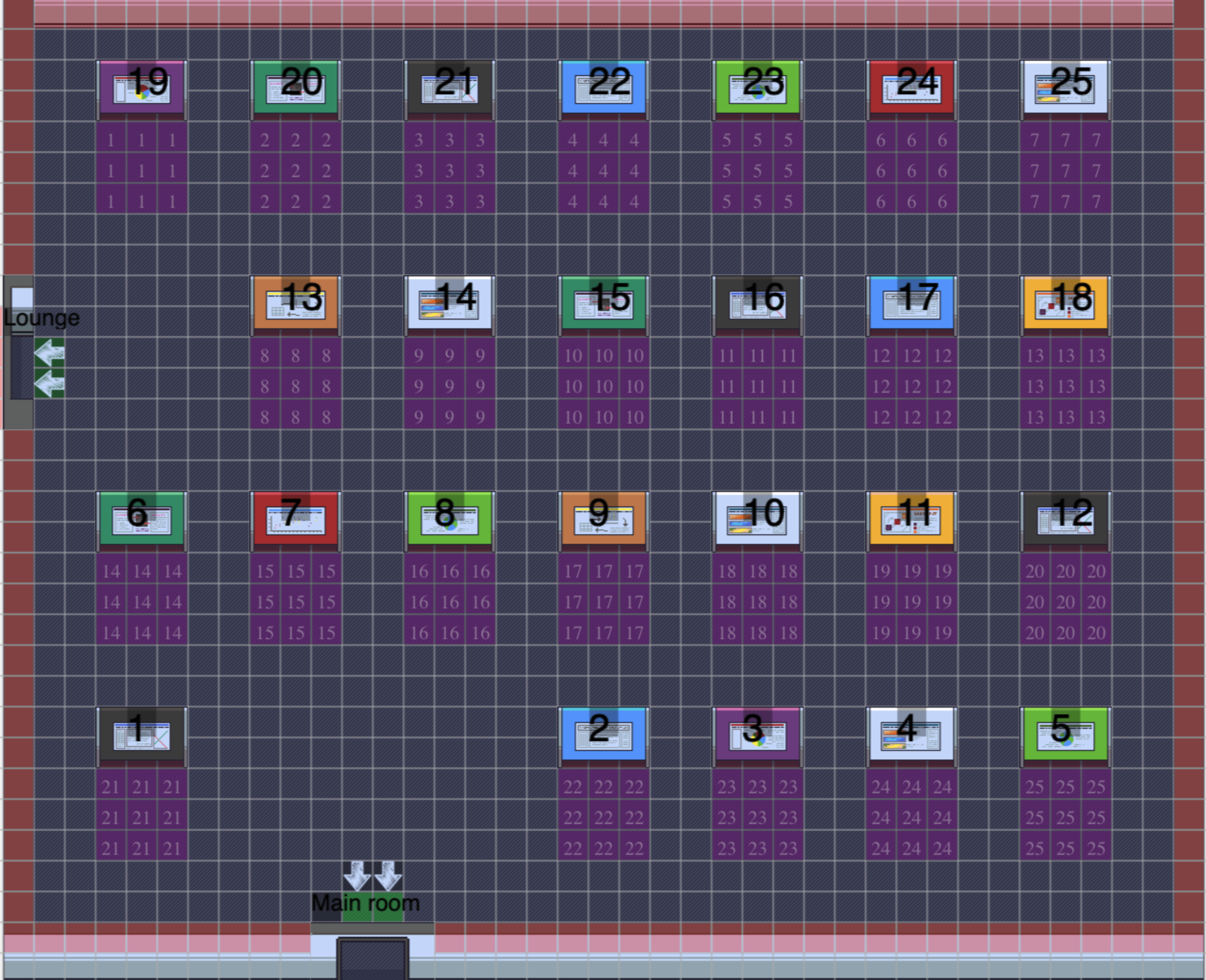2021 IEEE North American School of Information Theory
Poster Sessions and Titles
Poster room layout
 |
Monday, June 21, 1:00-2:30 pm PDT
Debarnab Mitra, Concentrated Stopping Set Design for Coded Merkle Tree: Improving Security Against Data Availability Attacks in Blockchain Systems
Fabrizio Carpi, Single-Shot Compression for Hypothesis Testing
Anindya Bijoy Das, Coded Sparse Matrix Computation Schemes That Leverage Partial Stragglers
Raaz Dwivedi, Revisiting Complexity and the Bias-Variance Tradeoff
Irem Ergun, Distributed Privacy-Preserving Machine Learning
Nahid Esmati, Private Linear Transformation: The Single Server Case
Konstantinos Konstantinidis, ByzShield: An Efficient and Robust System for Distributed Training
Ning Zhang, Attributed Graph Alignment
Bo Guan, Superstring-Based Sequence Obfuscation to Thwart Pattern Matching Attacks
Mahshad Shariatnasab, On Graph Matching Using Generalized Seed Side-Information
Nishant Mehrotra, DoF Region for Joint Imaging & Uplink Communication
Noah Brüstle, Variations on the Magic Square Game and Their Communication Class
Yinbin Ma, A General Coded Caching Scheme for Scalar Linear Function Retrieval
Somalatha U, Role of Shared Key for Secure Communication over 2-User Gaussian Z-Interference Channel
Serhat Bakirtas, Database Matching Under Column Deletions
Hibatallah Alwazani, Channel Estimation for Distributed Intelligent Reflecting Surfaces Assisted Multi-User MISO Systems
Shraddha Sahoo, Finite Block Length Achievable Rates for Interference Limited Scenarios’
Deeraj Kumar, Finite Block Length Information Theory and Its Importance in Mission Critical Applications
Sarah Bahanshal, Binary Decomposition and Coding Schemes for the Peak-Constrained IM/DD Channel
Siyao Li, A Control-Theoretic Linear Coding Scheme for the Fading Gaussian Broadcast Channel with Feedback
Mobina Mobaraki, Vision- Based Real-Time Seam Tracking and Defect Detection in GMAW Fillet Welding Process Using Neural Networks
Ziao Wang, Universal Graph Compression: Stochastic Block Models
Ruowen Bai, Kramers-Kronig Based Optical OFDM for Bandlimited Visible Light Communications
Jovana Plavsic, Visualization of Digital Twin Data
Morteza Shoushtari, Caching for Secrecy over the Binary Erasure Wiretap Channel
Thursday, June 24, 1:00-2:30 pm PDT
Anuj Yadav and Manideep Mamindlapally, Role of Costs in Commitment over Noisy Channels
Reza Rafie Borujeny, A Perturbative Channel Model for Optical Fiber
Matias Pinto, Swarm Intelligence for Decentralized Decision Making in Mining
Minoh Jeong, Permutation Recovery by Linear Decoding: Optimality and Asymptotics
Sarthak Jain, Scheduling and Relaying for Half-Duplex Wireless Networks: Efficiency and Optimality
Deborsi Basu, Dynamic Network Slicing and VNF Embedding in QoS-Aware Softwarized 5G Networks
Jian-Jia Weng, An Information Bottleneck Problem with Rényi's Entropy
Ecenaz Erdemir, Active Privacy-Utility Trade-Off Against a Hypothesis Testing Adversary
Zhenyu Zhang, On Implementing a Neural Network Based Costa's Dirty Paper Coding Scheme
Haoyue Tang, Cache Updating Strategy Minimizing the Age of Information with Time-Varying Files’ Popularities
Nourhan Hesham, The Average Coding Rate of Large-Scale Wireless Networks in the Finite Block-Length Regime
Sourbh Bhadane, Principal Bit Analysis: Autoencoding with Schur-Concave Loss
Borna Sayedana, Cross-Layer Communication over Fading Channels with Adaptive Decision Feedback
Ningze Wang, Multi-Message Private Information Retrieval Using Random Input Key
Neha Sangwan, Communication with Adversary Identification in Byzantine Multiple Access Channels
Bharath Shamasundar, Spectral Efficiency of Multi-Antenna Index Modulation
Neel Gandhi, Training Quantum Machine Learning Models with Aid of Kernels
Surabhi Garudangiri Dayananda, Orthogonal Time Frequency Space Modulation (OTFS)
Reent Schlegel, Privacy-Preserving Coded Mobile Edge Computing for Low-Latency Distributed Inference
Mahmoud Hasabelnaby, End-To-End Rate Enhancement in C-RAN Using Multi-Pair Two-Way Computation
Tao Jiang, Learning to Reflect and to Beamform for Intelligent Reflecting Surface with Implicit Channel Estimation
Kareem Attiah, Deep Learning for Distributed Channel Feedback and Multiuser Precoding in FDD Massive MIMO
Hassan ZivariFard, Keyless Covert Communication via Channel State Information
Ammarah Kaderdina, Improving Diagnosis of Developmental Hip Dysplasia Using Location-Tagged 2D Ultrasound
Ziteng Sun, Interactive Inference Under Information Constraints